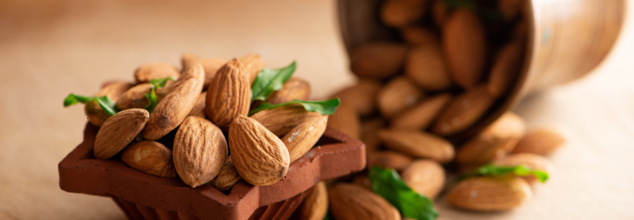
Blood Sugar Spikes Won’t Be An Issue If You Eat These Carbs
The food we eat has a direct impact on our well-being. No matter what foods you may be eating, your body will break them down to essential nutrients and use them as fuel to run all functions. So, why does it matter whether the fuel we take a healthy or not? It matters because if you do not eat the right foods, your body will have to overcompensate for the lack, which will in turn hurt your body.
That’s why one must ensure that the food they eat is good enough. As we know, our body needs essential carbs and fat to stay energized. However, many people are told to skip most carbs as they can cause blood sugar spikes. So how does one find the balance?
According to the American Journal of Clinical Nutrition, the reason why junk foods cause rapid blood sugar spikes is because they breakdown too easily, causing glucose to enter our blood stream in a rapid succession. While blood sugar spikes happen to everyone, it is worse for people who are diabetic, prediabetic or at risk of it. It becomes a concern when your body is producing less insulin as it is a necessary hormone to breakdown the blood glucose for use. So how does a person who is predisposed to have high blood sugar navigate this issue?
The answer is simple: you go for fiber!
Fiber: The Blood Sugar-Friendly Carb
In a widely viewed YouTube video, Dr. Eric Berg, popularly known as Dr. Berg on social media, who is a board-certified chiropractor and the author of 'The Healthy Keto Plan,' identified fiber as the singular carbohydrate that "doesn't influence insulin." This unique characteristic makes fiber an exceptionally beneficial dietary component, particularly for individuals closely monitoring their blood glucose, such as those with diabetes. Unlike other carbohydrates that are broken down into glucose and cause a subsequent rise in insulin to manage the increased blood sugar, fiber passes through the digestive system largely undigested. This lack of insulin response makes fiber an ideal carbohydrate choice for maintaining stable blood sugar levels.
How Can You Optimize Your Nutrition and Steady Blood Sugar?
To maintain stable blood sugar levels while ensuring optimal nutrition, it's advisable to be mindful of the types of carbohydrates consumed. When incorporating carbohydrates into a meal or snack, pairing them with a source of protein is highly beneficial. Good protein options include lean meats, a small handful of nuts, or low-fat dairy products. Here are some foods that should be a bigger part of your diet.
Whole Grains
Opt for minimally processed grains like quinoa, brown rice, oats, barley, whole-wheat bread, and whole-grain pasta, which release glucose more slowly.
Starchy Vegetables
Include nutrient-rich starchy vegetables such as sweet potatoes, corn, and peas in moderation.
Legumes
Incorporate lentils, beans, and chickpeas, which are excellent sources of both fiber and protein, further aiding in gradual carbohydrate absorption.
Fruits
Enjoy fruits like berries and apples, which provide fiber and essential nutrients, while being mindful of portion sizes due to their natural sugar content.
Non-Starchy Vegetables
Make non-starchy vegetables like broccoli, cauliflower, and leafy greens a dietary staple, as they are low in carbohydrates and high in beneficial fiber.
Nuts and Seeds
Include almonds, walnuts, chia seeds, and flax seeds for their healthy fats and fiber content.
Effective Strategies to Keep Your Blood Sugar In Check
To help keep blood sugar steady, it's important to do more than just pick the right carbs. Centers of Disease Control and Prevention (CDC) explains that combining carbs with protein and healthy fats helps your body digest them slowly, stopping big sugar rushes. Choosing whole, unprocessed foods like whole grains, fruits, and veggies over processed stuff is also key. Remember to watch your portion sizes, even with healthy carbs. Drinking enough water is helpful too. Getting regular exercise makes your body better at using sugar. If you have diabetes or worry about your blood sugar, checking it often can show you how different foods and activities affect you.

Credits: Canva
Common Cooking Oil Ingredient May Cause Your Breast Cancer
A new study, titled: Direct sensing of dietary ω-6 linoleic acid through FABP5-mTORC1 signaling,
has sparked concerns about an ingredient commonly found in household kitchens—linoleic acid. This omega-6 fatty acid, present in several cooking oils like soybean and safflower oil, may increase the risk of developing a particularly aggressive form of breast cancer known as triple-negative breast cancer (TNBC).
What Is Linoleic Acid and Where Is It Found?
Linoleic acid is a type of polyunsaturated fat, primarily found in seed oils such as corn, sunflower, soybean, and safflower oil. It's also present in some animal products like pork and eggs. While omega-6 fatty acids are essential for our health, recent findings suggest that an overconsumption—especially in the form of refined cooking oils—could have serious consequences.
The Link to Triple-Negative Breast Cancer
According to a preclinical study conducted by Weill Cornell Medicine and published in Science, linoleic acid appears to fuel the growth of TNBC cells. Researchers discovered that this fatty acid activates a key growth pathway in tumor cells by binding to a protein called FABP5, which is found in high amounts in triple-negative tumors. In mouse models, a diet high in linoleic acid significantly enhanced tumor growth.
Triple-negative breast cancer is more invasive, tends to spread quickly, and has fewer treatment options. Its survival rate is about 77%, notably lower than the 90% for other types of breast cancer.
Why This Matters for Your Diet
Experts now caution against the excessive use of seed and vegetable oils high in linoleic acid. While not calling for complete elimination, they suggest moderating intake and balancing fats with healthier alternatives like olive oil or omega-3-rich sources such as flaxseeds and fatty fish. The study’s senior author, Dr. John Blenis, emphasized that these findings can help personalize dietary recommendations for individuals at higher cancer risk.
Is Cancer Risk Only About Diet? Not Quite
While diet plays a role, about 5% to 10% of cancers, including breast cancer, result from inherited genetic mutations. If multiple members of your family have had breast or related cancers, you may be at increased risk due to mutations such as BRCA1 or BRCA2.
Genetic testing is a simple and non-invasive way to assess your risk. It involves a cheek swab, saliva, or blood sample and can screen for over 100 different gene mutations.
What to Do If You Test Positive for a Cancer Gene
A positive test result doesn’t mean you’ll definitely develop cancer—it just means your risk is higher. If you test positive:
- See a genetic counselor to understand your results and next steps
- Increase surveillance with regular screenings like mammograms or MRIs
- Consider preventive steps, including medication or surgery if recommended
- Make lifestyle changes—a healthy diet, exercise, and no smoking can reduce overall risk
- Inform family members so they can consider testing as well
What New About Cancer That We Know Of?
Scientists have uncovered how aspirin might help reduce the spread of certain cancers by boosting the immune system. The findings were published in the journal Nature, titled, Aspirin prevents metastasis by limiting platelet TXA2 suppression of T cell immunity. The findings could support the ongoing clinical trials and pave the way for more targeted use of aspirin in cancer treatment. This discovery can also now contribute to developing new drugs which are aimed at preventing cancer metastasis.
There have been previous studies which has shown how people who consume aspirin on a daily basis tend to have a lower risk of cancer spread. This works especially in breast, bowel and prostate cancers. However, researchers were unsure on how it actually played the role. This new study thus helps in finding that link and is conducted by the researchers at the University of Cambridge.
Cancer starts in one location, but in about 90% of cases, death occurs when it spreads to other parts of the body. Scientists have been studying the immune system’s role in this process, as cancer cells that detach from the main tumor are vulnerable to immune attack. While primary tumors can suppress the immune system, individual cancer cells that travel through the body are often more exposed, making them potential targets for treatment.
In a previous study, researcher screened 810 genes in mice and found that 15 of them influenced cancer metastasis. The researchers were able to discover that mice lacked a gene responsible for producing a protein called ARHGEF1 had fewer metastases in lungs and liver. The research also showed that ARHGEF1 suppresses T cells, which are immune cells that play an important role in killing metastatic cancer cells.

(Credit-Canva)
Does Having A Gluten-Free Diet Mean You Have A Healthy Diet?
There are many people who avoid foods with gluten, whether it is due to allergies or they believe it is a healthier diet to follow. When weight loss diets are brought up, many people turn to gluten free diets as the holy grail of weight loss. But is a gluten-free diet always healthy? This idea often comes from things they read online or see in the media, which aren't always based on real science. However, doctors and researchers say these claims aren't supported by solid medical evidence. According to Plant Foods for Human Nutrition 2025, gluten-free products have less protein and more sugar, increasing its calories as well.
Gluten is a protein found in wheat, and only people with celiac disease, wheat allergies, or gluten sensitivity need to avoid it. For everyone else, choosing gluten-free products just because they think it's healthier might not be the best choice and may actually be less healthy.
Gluten-Free vs. Regular Products
In a study published in the Journal of Human Nutrition and Dietetics researchers compared many gluten-free foods with their regular, gluten-containing versions. They looked at things like how many calories, how much sugar, how much fiber, and how much protein were in each. They found that gluten-free products often have more sugar and calories. This means they might not be good for people trying to watch their weight. Gluten-free foods also tend to have less protein, which is important for building muscles and staying healthy. However, they did find that gluten-free foods often have more fiber, which is good for digestion. This is likely because companies add extra fiber to these products. Overall, the study showed that gluten-free foods are often made with different flours that are higher in carbs and lower in protein compared to wheat flour.
Making Informed Choices
If you have celiac disease or a wheat allergy, you must eat gluten-free. However, if you don't, you should think carefully before switching to a gluten-free diet. It's important to look at the nutrition labels and compare products. A healthy diet is about eating a variety of whole foods, like fruits, vegetables, and whole grains, not just focusing on whether something is gluten-free. If you buy packaged foods, look for products with simple ingredients and avoid those with lots of additives or sugar. Even if you want to avoid gluten, you can still eat healthy grains like quinoa or buckwheat. These grains are naturally gluten-free and provide important nutrients. Remember, it's the overall quality of your diet that matters most, not just whether you eat gluten or not.
Here are some healthy gluten free options you can try incorporate to your diet according to Mayo clinic.
Fresh fruits and vegetables
Enjoy nature's bounty! Opt for fresh produce, avoiding processed versions with hidden gluten in sauces or coatings.
Beans, seeds, legumes, and nuts
Embrace these natural powerhouses! Choose unprocessed forms for a gluten-free protein and fiber boost.
Eggs
Versatile and nutritious! Eggs are naturally gluten-free, providing essential proteins and vitamins for a balanced diet.
Lean, nonprocessed meats, fish, and poultry
Select unseasoned, lean proteins to ensure a naturally gluten-free meal option.
Most low-fat dairy products
Plain milk, yogurt, and unprocessed cheese are typically gluten-free, offering calcium and protein.

Credits: Canva
Almonds Are A Great Addition To Indian's Diet, Finds Study
A recent study published in the journal Current Developments in Nutrition found that eating almonds daily can actually keep your blood sugar levels in control. This is specifically true for the population like "Asian Indians". This was done by an international team of researchers who analysed previously published research on almonds and cardiometabolic health. They found that almonds can, in fact, help improve metabolic health by reducing 'bad' cholesterol and increasing beneficial gut bacteria.
The team also published as a consensus article which also reinforced almond's role as a heart-healthy, weight-supporting and gut-friendly food.
What Do The Experts Say?
Dr Anoop Misra, who is the chairman of Fortis Centre for Diabetes, Obesity and Cholesterol, and study author told PTI that the findings also revealed how almonds can benefit specific population. The population in concern is Asian India, where rising rates of cardiometabolic diseases are a concern.
Healthy Heart - A Key Benefit of Almond
Almonds have been found to lower LDL cholesterol—often referred to as 'bad' cholesterol—by around five units. They also lead to small but significant reductions in diastolic blood pressure, in the range of 0.17 to 1.3 mmHg. These changes, though modest, can add up over time and contribute to better cardiovascular health.
Better Blood Sugar Control
For people with pre-diabetes, especially Asian Indians, daily almond consumption can help lower fasting blood glucose and HbA1C levels. This suggests that almonds may play a role in managing or even delaying the onset of type 2 diabetes. The study pointed out that almond intake improves glycemic response in this population group without contributing to weight gain.
No, Almonds Don’t Cause Weight Gain
A common misconception is that almonds lead to weight gain due to their fat content. However, researchers found that consuming more than 50 grams of almonds per day could actually lead to a slight reduction in body weight. Dr. Anoop Misra explained that the protein, fiber, and healthy fats in almonds keep people fuller for longer, helping to manage appetite and reduce overall calorie intake.
ALSO READ: Too Many Almonds Can Lead to Kidney Stones: Here's How Many To Consume
Support for Weight Loss Efforts
When paired with a balanced diet and regular physical activity, almonds can be part of a healthy weight loss strategy. Dr. Misra noted that almonds help stabilize energy levels and minimize fluctuations in hunger, making it easier for people to stick to their nutrition plans.
A Healthy Gut Boost
Almonds also have a positive effect on gut health. They help increase the population of healthy gut bacteria and boost the production of short-chain fatty acids, which are linked to better metabolic function. According to the researchers, these gut-related benefits can indirectly help reduce excess body fat.
Far from being a guilty pleasure, almonds are a nutrient-rich food that can support heart health, blood sugar control, weight management, and even gut health. Whether you're looking to improve overall wellness or manage specific health conditions, a handful of almonds a day might just do the trick.
© 2024 Bennett, Coleman & Company Limited

